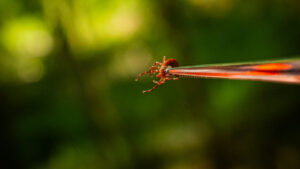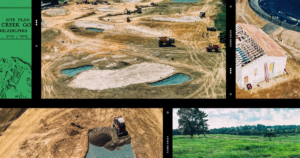my interest in fossils began at the age of 10 in my back garden in Glastonbury, Somerset, where I discovered ammonites. In retrospect, it wasn’t beauty that drew me to them, but the magic of discovery. I was drawn in by their sheer age and the unfathomable nature of the distant past.
After my degree in natural sciences in 1965, I wanted to go as far as possible, so I applied to teach biology in Ghana. It was a fantastic period of my life where I discovered much more than stones in the back garden. After eight years I came back to the UK, and spent much of the following decades raising four children. At times it was a difficult life and I gave up all my dreams of research.
I thought, I would enjoy fossilizing when I retire at 60 – but I didn’t plan to get that serious about it. I had a vague interest in a local site in Weymouth on the Jurassic Coast. Quickly I could tell it was a treasure chest, but no one had researched it. Now I’m almost 80, and I’ve discovered more than 2,000 fossils after devoting 20 years of my life to paleontological research. Retirement really is an opportunity to explore new interests – if you’re healthy.
When I look for fossils, I get on my hands and knees so I’m close to the ground – they’re small, typically 1cm-2cm. I miss things now that I would have seen in the past. The place is very stony and muddy, and kneeling in the mud at my age is difficult. Sometimes I wonder if I will get back up, or fall over and break a hip.
I can’t collect like I used to because I can’t see so well. Losing my sight is not frustrating because I pass my knowledge on to my mentee – a serious collector who is younger than me and has brilliant eyesight. He found a pterosaur jaw a month ago which is a very important and rare find.
I do this work for free. Now that I’m retired, I’m free to follow leads, and I’ve learned so much from open access journals, the internet, and fossil communities on social media. In some cases I have been treated badly by academics who do not want to look at my fossils because they are in a private collection. You must have a thick skin. Others were very supportive.
There has been no academic research whatsoever on these fossils in Weymouth. I have 350 pieces of pterosaurs, which were flying reptiles. They’ve been flying over this sea for 160m years – that’s a damn sight longer than humans have been around! They were plentiful, like seagulls, and now they are extinct, the whole flickering bunch of them. My fossils can help establish what biodiversity was like all those years ago.
Some young PhD students were the first to look at the fossils on my kitchen table in 2012. I had about 15 marine crocodile teeth that were 153m years old. They were beautiful – perfect, even – often with their full enamel intact.
Those two students were curious and cooperated, and I donated my alligator teeth to them. They went on to write many papers on crocodylomorphs and I co-authored two.
I want to inspire people, not because I want to be a saint, but because I want to pass on this knowledge. When I die, everything I’ve learned for 20 years will disappear unless I pass it on with enthusiasm. This is an important national site, and I want to be sure that fossil collectors who go there understand the value of what they find. Otherwise, fossils of great significance will be lost, and they should not be. I just did co-author of a book about my work My record keeping is meticulous – this is another quality you need. I turned a large upstairs bedroom into a fossil study, and they’re all there. It’s like a mini museum.
Collecting fossils is therapeutic; it’s in the fresh air, it’s exercise, and then there’s the thrill of discovery. It’s like going on safari – when you don’t find things all the time, it makes it more satisfying when you do. It’s not like Lyme Regis, where big storms throw up big finds. This is a soft site, and things are revealed on a quieter scale. You need determination and patience.
Doing the photo shoot for this article when I’m almost 80 is cause for a bloody big glass of champagne. It’s ridiculous but I like it. This is an example of women at work, not dressed in high heels. This is an alternative view, which I am very keen on. I advocate for women of all ages in science. What tremendous fun I had. It’s fun, for heaven’s sake!
As told to Phoebe Weston





